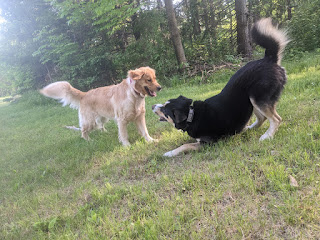Understanding "Fear" Stages in Adolescents
Parts of this post were taken from the Confident Canines Coaches Class.I'm pretty sure every dog owner on the planet wants the very best for their dog, wanting them to be successful and happy in life. (I'm sure there are exceptions to that, but those are not MY PEOPLE and we are not going to worry about them here!) I'm confident that no one reading my blog wants a dog who is scared, fearful or traumatized!
Yet, I'm also pretty confident that most dog owners have never thought about protecting a dog's confidence unless you've had a personal experience with a fearful dog that you've been trying to help. If you follow Absolute Dogs then you might be more familiar with the idea of protecting your dog's optimism. Confidence & Optimism go hand in hand to develop Resiliency! So for this post, those words are pretty much interchangeable so I'm going to stick with the term "confidence" in this section.
It's particularly important to protect our dog's confidence especially through adolescence and young adult stages, however these tips can also apply to older dogs of any age. Even my boy Cam, who dealt with fear and anxiety his whole life needed help with protecting his confidence at 9 yrs old. My overly confident young adult, Azul & my overly confident adolescent, Roz need help protecting their confidence as well.
Fear stages
As our sweet cuddly puppies transition into adulthood, they go through various "fear" stages. Many on the dog training community challenge the name "fear" stages because so much more is happening at that time then an increased risk of experiencing fear. Adolescents often struggle with fear, impulsiveness, dis-regulation, and increased emotional outbursts. (Does this sound kinda like a human adolescent?) Needless to say, the term "fear" stage is well known in the dog training community and fear is the part that is most likely to be recognized by dog owners that are not dog training experts. Therefore I'm going to continue calling these times of increased brain changing activity as fear stages.Some experts say that most dogs go through 3 fear stages and a few dogs go through 4 fear stages. I'd like to challenge that and say that all dogs go through 4 fear stages and possibly 5, however the older they are the less the stage impacts their behaviors making it more challenging for owners to recognize the stage as a fear stage. We do have a ton more information on fear stages and the science we know about them in our Positively Puppy Paws Classroom & our Crazy Canine Adolescents Classroom if you want more info.
During a fear stage (no matter how old or whether it is the dog's 1st-4th fear stage) the dog's brain is going through a period of change or rewiring of connections from Point A to Point B in the brain. These are naturally occurring changes that all animals go through as they transition from the baby stage of wanting to stay close to mom/family for safety to the more independent role of being able to manage on their own as a fully functioning adult. Even humans go through this type of change as they develop, it just takes a lot more time for humans then it does our dogs.
When a dog is in a fear stage we see a few things that develop a common pattern which help us as dog owners recognize the stage as a time of fearfulness.
During a fear stage (no matter how old or whether it is the dog's 1st-4th fear stage) the dog's brain is going through a period of change or rewiring of connections from Point A to Point B in the brain. These are naturally occurring changes that all animals go through as they transition from the baby stage of wanting to stay close to mom/family for safety to the more independent role of being able to manage on their own as a fully functioning adult. Even humans go through this type of change as they develop, it just takes a lot more time for humans then it does our dogs.
When a dog is in a fear stage we see a few things that develop a common pattern which help us as dog owners recognize the stage as a time of fearfulness.
Fearfulness: This is the most noticeable as our dogs often are suddenly afraid of something that is in the environment that they never seemed to notice before.
Impulsiveness: Think of this as the "leap before you look" struggle. Our dogs see something and want to get to it so quickly that they may not notice certain hazards between them and what caught their eye.
Forgetfulness: They knew certain cues, routines, and habits before that suddenly fly out the window and they act as if they have no idea what you're expecting from them in this moment. Fearfulness is the easiest for us to recognize and probably why we call these stages "fear stages!" Over the years, I've found some commonalities to the things that dogs find fearful at certain ages.
Watch for upcoming posts this month that on each of these definitions and how we can use the science to help protect our dog's confidence and optimism.
Watch for upcoming posts this month that on each of these definitions and how we can use the science to help protect our dog's confidence and optimism.
Understanding Adolescents Series


_20250507_102709_0005.png)


No comments:
Post a Comment